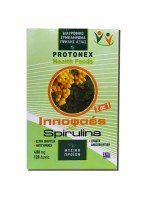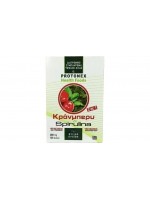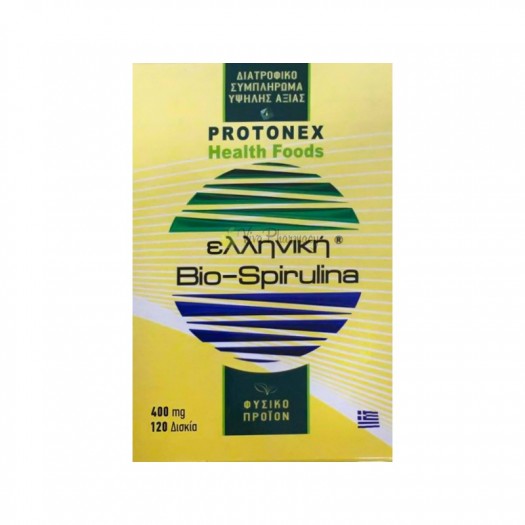Protonex Greek Bio-Spirulina 400mg does not contain Iodine, 120 tablets
- Availability: In Stock
- Brand: Protonex
- Product Code: 5200121201019
- Product viewed: 5069
-
€19.08
General information about Spirulina:
Spirulina is a primitive multicellular microfiche that appeared on earth 3.5 billion years ago. With its ability to photosynthesize, doubling its biomass, it absorbs large amounts of carbon dioxide (CO2) and binds atmospheric nitrogen (N).
It has contributed to the shaping of the modern earthly atmosphere, enriching it with plenty of oxygen. Biologically it is characterized as an organism thermophilic (optimum 35c) and alkalopelos (PH 9-11). Historically, the Spanish conquerors of Mexico in the 16th century observed the Aztecs collecting fine spirulina nets from fine lakes and turning it into a cake, a major component of their diet. Today this process is done systematically in Lake Texcoco. A similar procedure is applied in Chad, Africa, on Lake Kossoron, where spirulina is a major component of local populations, especially for pregnant women and local pharmaceuticals. After World War II, German and French professors studied spirulina in detail. In 1967, spirulina was named "the great food source of the future". by the International Association of Microbiologists. More recently, NASA has chosen spirulina as its main source of nutrition for astronauts.
Biochemical composition of the Greek bio-spirulina:
Spirulina contains about 100 substances and simple elements.
. Protein: From 60-70% by dry weight. It contains all the essential amino acids and ten of the non-essentials, ie it is a "complete" protein that is superior to milk, meat and egg protein, with a solubility of 95%.
¬ Vitamins: Contains vitamins: B-1 (thiamine), B-2 (riboflavin), B-3 (nicotinamide), B-6 (pyrodoxin), B-9 (folic acid), B-12 (cyanocobalamin), vitamin C, vitamin D and vitamin E, biotin (H), folic acid, inositol and provitamin A.
Τητα Necessary fatty acids: It has a high content (30-60%) polyunsaturated (PUFA), especially in omega-3 fatty acids, such as γ-linolenic (ALA, linoleic (LA), stearidonic (SDA), eicosapentaenoic (EPA), docosahexaenoic). (DHA) and arachidonic acid (AA), Palmitic acid, Oleic acid
Στοιχεία Metallic elements: Contains Calcium, Potassium, Magnesium, Sodium, Manganese, Phosphorus, Copper, Celery, Iron, Zinc. It does not contain iodine.
Το Photosynthetic dyes: Chlorophyll, Phycocyanin, Carotenes, Xanthophyll, Canthaxanthin, β-Cryptoxanthin, Phycobiliproproteins.
¬ Nucleic acids: Contains Ribonucleic acid (RNA) and Deoxyribonucleic acid DNA.
Beneficial properties:
The spirulina you bought is a tiny seed-grown plant from one of Germany's largest universities that has the largest algae bank in the world. As a plant, it is an amazing organism that exists and reproduces for 3.5 billion years, to which we owe our existence (first production O2). It is the only plant cultivated in tanks - circular tracks looking for food and solar energy in the form of photons, certain wavelengths of the light spectrum. Before reaching your hands, it has "run" about 40 kilometers, as much as a marathon.
The different elements that spirulina provides us are completely water soluble and completely digestible, offering extra energy, supplementing the deficiencies of the daily diet, restoring the right metabolic balance. It increases performance in mental and physical work, sports and the mood for competitive discrimination in the spaces where every modern person moves.
According to an official publication by the Food and Agriculture Organization (FAO) of the United Nations (Circular 1034 FIMA / C1034 (En), 155N 2070-6065 of 2008), spirulina is recognized as a supplementary cure in many diseases or health problems. Most important is the boost of the immune system by Phycocyanin, which drastically reduces blood lipids, fights the feeling of "fatigue" by increasing the levels of immunoglobulin A (IgA) and M (IgM). (1)
. Protein, vitamins, minerals and polysaccharides improve all physical performance, especially in athletes. In weightlifters it increases the capacity of the lungs without affecting blood pressure.
Sp The dry biomass of spirulina contains up to 2% γ-linoleic acid (GIA), a percentage equal to that of breast milk. This high rate helps with arthritis, obesity, cardiovascular disease and zinc deficiency syndrome.
Sp Spirulina in experiments conducted in Germany and Japan, has shown that it lowers cholesterol, triglycerides and low-density lipoproteins in the blood, acting beneficially in the fight against atherosclerosis. (2)
. Due to the very high content of organic, immediately digestible iron, spirulina helps directly to correct anemia, low hematocrit and menstrual syndrome. (3)
¬ Current studies are investigating the positive effect of spirulina on cancer prevention (leukemia), the protection of people undergoing radiation-chemotherapy and on antiviral activity to help people infected with the AIDS virus.
Due to its amazing properties in both nutrition and prevention of serious diseases, the UN funds extensive spirulina production and distribution programs mainly for children in Africa, Asia and South America.
How to consume it:
- Two pills in the morning with a glass of water or juice and two at noon half an hour before eating for better absorption of iron.
Interactions with other drugs have NOT been observed and there is no risk of overdose.
THERE IS NO IODIO
Indicative bibliography
(1) Liu, YF, Lz, Cheng, N., Lin, LJ & Zhang, CW2000. Inhibitoryeffect of phycocyanic from Spirulina platensis on the growth of human leukemia K 562 cells. J.Appl. Phycol., 12: 125-130.
(2) Henrikson, R. 1989. Earth food Spirulina. San Rafael, California, USA, Ronorc Enterprizes, Inc.
(3) Anuradha, V. & Vidhya, D. 2001. Impact of Spirulina administration on blood glucose levels of selected diabetic patients. Indian J. Nutri. & Diatetics, 38: 40-44.



